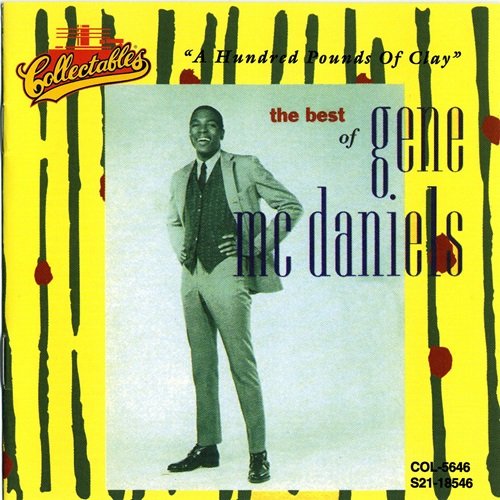Gene McDaniels was a multifaceted artist who was best known as a pop/R&B vocalist in the early to mid-'60s, just as R&B was beginning to evolve into soul. He scored polished and passionate hits that showed off his strong, clear voice including "A Hundred Pounds of Clay," "Tower of Strength," and "Chip Chip." McDaniels also distinguished himself as a songwriter and producer, writing the hit "Feel Like Makin' Love" for Roberta Flack and the thoughtful and oft-covered "Compared to What," as well as helming sessions for Nancy Wilson, Melba Moore, Jimmy Smith, and Lenny Williams. His best-known work of the '60s can be heard on the collection A Hundred Pounds of Clay: The Best of Gene McDaniels, a solid sampler of his classic Liberty Records sides, while his adventurous work of the '70s, steeped in social and political commentary, is well represented by the 1971 cult item Headless Heroes of the Apocalypse.
Born Eugene Booker McDaniels in Kansas City, Kansas in 1935, and later raised in Omaha, Nebraska, he was the son of a minister. Gospel music, along with the words of the Bible, filled his life early on, and his idols included the Soul Stirrers and the Swan Silvertones. Before his teens, he also discovered jazz just as bebop was sweeping the field, and he became an early admirer of Charlie Parker and Miles Davis. He always gravitated toward singing, not surprising given his four-octave range, but he also became proficient on the saxophone and the trumpet.
McDaniels' first performing group, the Echoes of Joy (later the Sultans) -- organized when he was 11 -- specialized exclusively in gospel music, but he later started to work popular tunes into their repertoire. Following a citywide singing competition in which he managed to distinguish himself amid the best of all of his peers, he started looking toward music as a career. McDaniels later forsook traditional academics in favor of study at the Omaha Conservatory of Music. He made his professional debut as a member of the Mississippi Piney Woods Singers, whose touring got him to the West Coast, where he began performing jazz as a solo singer in his spare time. Eventually, he began singing with his idol, Les McCann, at a club called The Lamp, which didn't last long but built McDaniels a following sufficient to get him noticed by Liberty Records.
After being signed by Sy Waronker, McDaniels was first put into the hands of producer Felix Slatkin, but their first two singles and an accompanying album failed to sell in serious quantities. His break came when Snuff Garrett took over as producer; Slatkin was a phenomenal musician, violinist, and conductor, but Garrett had an ear for sound and songs that was second to none, and was responsible for corralling the tune that became McDaniels' first hit, "A Hundred Pounds of Clay." The singer himself hated the song, believing it too simplistic in the wake of the jazz he'd been singing for the previous decade, but Garrett's instincts proved correct. The single reached number three in the spring of 1961 and earned a gold record award. While his next single, "A Tear," was a minor chart hit, the song after that -- "Tower of Strength," co-written by Burt Bacharach -- reached number five and earned McDaniels another gold record award in the process.
He saw regular chart action over the next three years, and even made it into one classic jukebox movie, It's Trad, Dad (1962, directed by Richard Lester), where he was seen performing "Another Tear Falls." However, McDaniels' brand of soul music gradually faded from popularity in the face of competition from figures such as Otis Redding and Sam & Dave, with their more raw, less pop-oriented sound. He left Liberty in 1965 and passed through Columbia and a small group of other labels. Following the assassination of Dr. Martin Luther King, Jr. in 1968, McDaniels departed the United States. For the next three years, he lived in Denmark and Sweden and spent his time writing. His songwriting was showing a sophistication that was a far cry from his lightweight Liberty material, especially "Compared to What," a literate and streetwise political broadside that was a hit for Les McCann & Eddie Harris, and "Feel Like Makin' Love," a sensuous soul groove that charted high for Roberta Flack, one of his favorite vocalists.
When he returned to America in 1970, he signed with Atlantic Records and resumed recording under the name Eugene McDaniels. His first album for Atlantic, 1970's Outlaw, was an ambitious and politically charged effort that blended funk, jazz, and rock with his dramatic vocals. 1971's Headless Heroes of the Apocalypse was even stronger and more outspoken, and supposedly a copy made its way to the White House, where Richard Nixon was outraged by the radical politics of the lyrics and Spiro Agnew urged Atlantic to suppress the album. In 1971, McDaniels cut an album for MGM Records as part of the group Universal Jones, titled Vol. One. It proved to be his last record for a long time, though he continued to work steadily as a songwriter and produced albums for Gladys Knight & the Pips, the Floaters, Nancy Wilson, Jimmy Smith, and actor Richard Roundtree. A final Eugene McDaniels album, Screams & Whispers, was released on his own Genepool Records label in 2004. Gene McDaniels died in his sleep at home in Maine on July 29, 2011.




